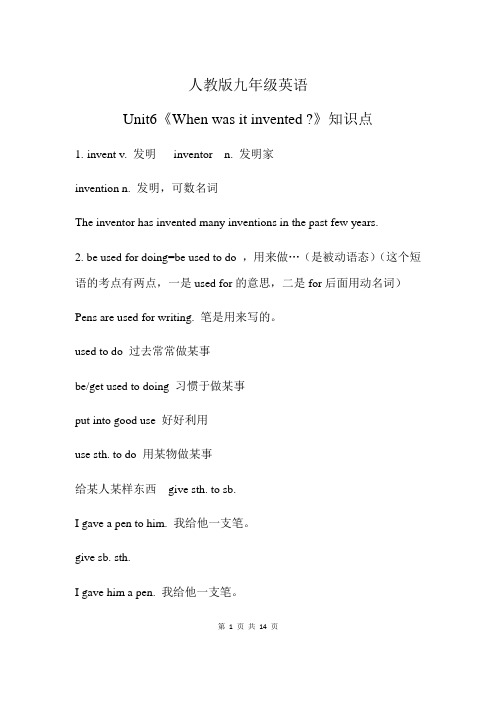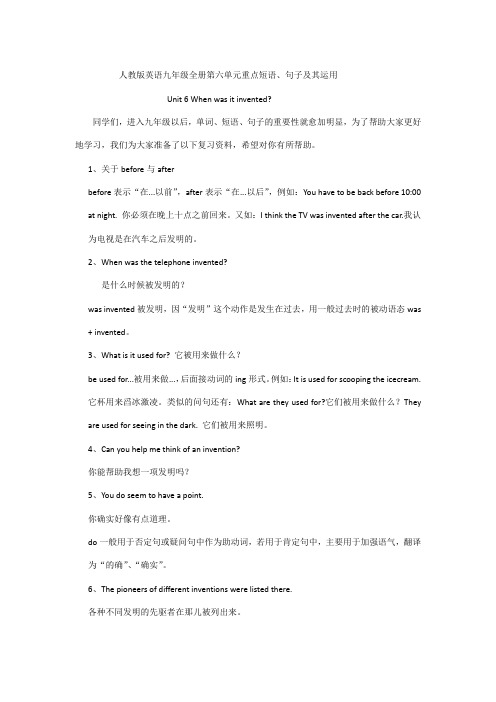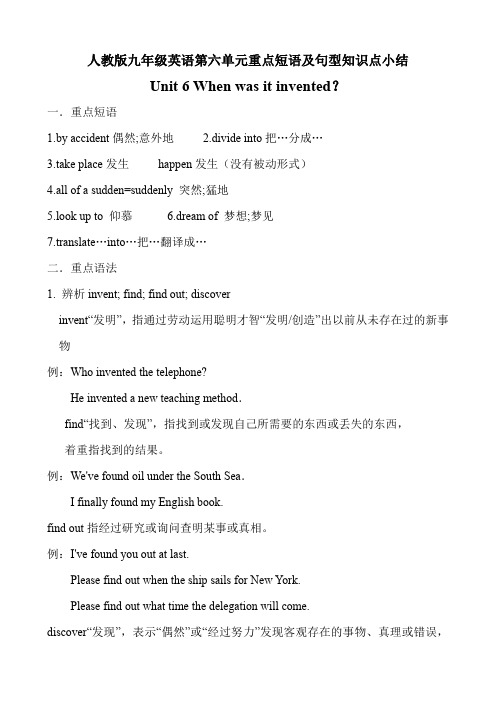人教版九年级英语 Unit6 When was it invented 重点知识精炼总结
人教版新目标九年级英语Unit 6讲义及重点总结

新目标九年级Unit 6 When was it invented? 讲义一、词性转换Section A1. electricity → (adj.) electric2. pleasure → (adj.) pleased3. accidental → (n.) accident4. ruler → (v.) rule5. boil → (adj.) boiling/ boiled6. national → (n.) nation7. low → (反义词.) high8. translate → (n.) translation9. sudden → (adv.) suddenly10. musical → (n.) music 11. instrument → (n.) instrumental Section B12. salty → (n.) salt13. Canadian → (n.) Canada14. divide → (n.) division15. popularity → (adj.) popular16. hero → (adj.) heroic17. professional → (n.) profession二、短语归纳1. the style of……的样式2. such a great invention 如此伟大的一项发明3. be used for被用于…4. by accident 偶然;意外地5. think of/ about 想;考虑6. fall into 落入;陷入7. some time 一段时间8. less than少于;不到9. take place发生;出现10. the popularity of……的普及11. without doubt毫无疑问12. at a low price以低价13. translate…into…把…翻译成…14. all of a sudden突然;猛地15. by mistake错误地;无意中16. in the end最后17. a cook called George Crum一个名字叫乔治克拉姆的厨师18. more than多于;超过19. divide…into…把…分成…20. at the same time同时21. stop…from doing…阻止…做…22. dream of/ about梦想;向往23. not only…but also…不但…而且…24. the number of……的数量25. more and more越来越26. look up to钦佩;仰慕27. achieve one’s dreams实现某人的梦想28. take notes记笔记29. be used to do sth. 被用于做某事30. lead to导致;导向三、句型集萃1. It is said that + 从句据说…2. It is believed that + 从句人们认为…3. ask sb. (not) to do sth.要求某人(不要)做某事4. teach sb. to do sth. 教某人做某事5. need to do sth. 需要做某事6. encourage sb. to do 鼓励某人做某事三、重点句子1. the style of the shoes 鞋的样式★style短语:in style 流行的;时髦的out of style 过时的a life style生活方式2. --- Can you help me think of an invention? 你能帮我想个发明吗?★★--- My pleasure! 乐意效劳!辨析:pleasure, pleased, pleasing, please与pleasantpleasure,名词,“愉快,高兴”,多用于口语:It’s my pleasure./ With pleasure.pleased,形容词,“高兴的,喜欢的”,修饰人;pleasing,形容词,“令人愉快的,讨人喜欢的;使人满意的,合意的”,修饰物;please,及物动词,“使高兴、满意、愉快”等;不及物动词,“高兴,愉快”等;pleasant,形容词,定语,“令人高兴的,令人愉快的”,修饰事物,不能修饰人。
人教版九年级英语Unit6知识点总结

人教版九年级英语Unit6《When was it invented ?》知识点1.invent v. 发明inventor n. 发明家invention n. 发明,可数名词The inventor has invented many inventions in the past few years.2. be used for doing=be used to do ,用来做…(是被动语态)(这个短语的考点有两点,一是used for的意思,二是for后面用动名词)Pens are used for writing. 笔是用来写的。
used to do 过去常常做某事be/get used to doing 习惯于做某事put into good use 好好利用use sth. to do 用某物做某事给某人某样东西give sth. to sb.I gave a pen to him. 我给他一支笔。
give sb. sth.I gave him a pen. 我给他一支笔。
第 1 页共14 页pass/offer /send/show/write/bring/sell/lend/serve/ tobuy/cook/make/get/sing/prepare for4. all day 整天all evening/night the whole day5. salty adj. 咸的salt n. 盐sour/sweet/bitter/hot/salty酸甜苦辣咸6. by mistake 错误地(犯错是:make mistakes=make a mistake,这些常见的短语大家务必要掌握)I took the umbrella by mistake. 我不小心拿错了雨伞。
7. by accident/chance 意外,偶然(常见短语,考的最多的是它的意思)I met her by accident at bus stop.我在公共汽车站意外地见到了她。
人教版九年级英语第6单元重点单词记忆法及词形变换(附例句)!

人教版九年级英语第6单元重点单词记忆法及词形变换(附例句)!
Unit6 When was it invented
Section A
【重点单词】
1.style样式;款式
[助记]读音记忆法:sty(star) + le(l)→样式;款式
This style of dress is very popular with young people.这种款式的衣服很受年轻人的欢迎。
2. project项目;工程
[助记]词根记忆法:pro-(向前)+ject(投掷)→扔向前面→投射,引申为工程;项目
This huge project will have to be completed in five years. 这项巨大的工程必须在五年内完成。
3.pleasure高兴;愉快
[助记]词根记忆法:please(取悦) +-ure(名词后缀)→高兴;愉快①Watching TV is our only pleasure.
看电视是我们唯一的乐趣。
②No song that gives you pleasure should also give you a sense of guilt.
没有一首让你快乐的歌会让你有罪恶感。
4. daily每日的;日常的。
Unit6Whenwasitinvented_重点短语句子及其运用2023-2024学年人教版英语九

人教版英语九年级全册第六单元重点短语、句子及其运用Unit 6 When was it invented?同学们,进入九年级以后,单词、短语、句子的重要性就愈加明显,为了帮助大家更好地学习,我们为大家准备了以下复习资料,希望对你有所帮助。
1、关于before与afterbefore表示“在...以前”,after表示“在...以后”,例如:You have to be back before 10:00 at night. 你必须在晚上十点之前回来。
又如:I think the TV was invented after the car.我认为电视是在汽车之后发明的。
2、When was the telephone invented?是什么时候被发明的?was invented被发明,因“发明”这个动作是发生在过去,用一般过去时的被动语态was + invented。
3、What is it used for? 它被用来做什么?be used for...被用来做...,后面接动词的ing形式。
例如:It is used for scooping the icecream.它杯用来舀冰激凌。
类似的问句还有:What are they used for?它们被用来做什么?They are used for seeing in the dark. 它们被用来照明。
4、Can you help me think of an invention?你能帮助我想一项发明吗?5、You do seem to have a point.你确实好像有点道理。
do一般用于否定句或疑问句中作为助动词,若用于肯定句中,主要用于加强语气,翻译为“的确”、“确实”。
6、The pioneers of different inventions were listed there.各种不同发明的先驱者在那儿被列出来。
were listed被列出来,一般过去时的被动语态。
九年级英语全册Unit6Whenwasitinvented知识点总结(超全)(带答案)

九年级英语全册Unit6Whenwasitinvented知识点总结(超全)单选题1、The hat is not the right ________ for me. I’d like a smaller one.A.sizeB.styleC.colourD.material答案:A句意:这顶帽子大小不适合我。
我想要小一点的。
考查名词辨析。
size大小,尺寸;style款式;colour颜色;material材料。
根据“I’d like a smaller one”可知,是尺寸不合适,故选A。
2、—Where do you think ________?—I guess they took it in Suzhou.A.was the photo takenB.the photo was takenC.did the photo takeD.the photo took答案:B句意:——你认为照片是在哪里拍的?——我想他们是在苏州拍的。
考查宾语从句。
本题动词“think”后跟宾语从句,从句用陈述句语序,故排除A、C;从句主语“the photo”与谓语动词“take”之间是被动关系,因此用被动语态,故选B。
3、— Look, Cindy. The flowers in our classroom come out in one night.— That's fantastic! They are beautiful and colorful. They________ nice. A.smellsB.smellC.soundsD.sound答案:B句意:——听着,辛迪。
我们教室里的花一晚上就开花了。
——太棒了!它们美丽多彩。
它们闻起来很香。
考查动词辨析和主谓一致。
本句主语They复数,可知谓语动词使用原形,可知排除A和D。
花应是闻起来很香,smell:闻起来;sound:听起来。
故选B。
初三英语上册(人教新目标)Unit6Whenwasitinvented知识点总结

初三英语上册(人教新目标)Unit 6 When was it invented?知识点总结一、重点辞汇·原文再现They are used for changing the style of the shoes.它们被用于改变鞋的样式。
·大体用法style n. 样式;样式Our children's different needs and learning styles created many problems.孩子们不同的需求和学习方式给咱们带来了许多问题。
·知识拓展---相关短语learning style 学习方式,学习风格life style 生活方式hair style 发型out of style 过时的Her dress is out of style.她的穿着不时兴。
·原文再现The subject for my school project is "Small inventions that changed the world."学校课题的题目是:改变世界的小发明“·大体用法project n. 项目;工程Project Hope 希望工程The project will create up to 40 new jobs.这项工程将提供40个新的工作职位。
·知识拓展---其他词性project v. 计划(plan)The next edition of the book is projected for publication in March.本书的下一版计划于三月发行。
·原文再现--Can you help me think of an invention?你能帮忙我想一个发明吗?--My pleasure!我很荣幸。
·大体用法pleasure n. 高兴;愉快Watching sport gave him great pleasure.观看体育比赛给他以极大的愉悦。
人教版九年级英语第六单元重点短语及句型知识点小结

人教版九年级英语第六单元重点短语及句型知识点小结Unit 6 When was it invented?一.重点短语1.by accident偶然;意外地2.divide into把…分成…3.take place发生happen发生(没有被动形式)4.all of a sudden=suddenly 突然;猛地5.look up to 仰慕6.dream of 梦想;梦见7.translate…into…把…翻译成…二.重点语法1. 辨析invent; find; find out; discoverinvent“发明”,指通过劳动运用聪明才智“发明/创造”出以前从未存在过的新事物例:Who invented the telephone?He invented a new teaching method.find“找到、发现”,指找到或发现自己所需要的东西或丢失的东西,着重指找到的结果。
例:We've found oil under the South Sea.I finally found my English book.find out指经过研究或询问查明某事或真相。
例:I've found you out at last.Please find out when the ship sails for New York.Please find out what time the delegation will come.discover“发现”,表示“偶然”或“经过努力”发现客观存在的事物、真理或错误,即指发现原来客观存在但不为人所知的事物,也可表示发现已为人所知的事物的新的性质或用途。
Columbus discovered America in1492.We soon discovered the truth.我们很快就弄清了真相。
【练习】a.Edison ____the electric lamp.b.I lost my necklace last night.I haven’t ____it.c.Who ____America first?d.Can you ____what time the train leaves?2.一般过去时的被动语态(见P188页)结构:was/were+过去分词【练习】( ) 1. People's Republic of China __ on October 1, 1949.A. foundB. was foundedC. is foundedD. was found( ) 2. English ____ in Canada.A. speaksB. are spokenC. is speakingD. is spoken( ) 3 This English song __ by the girls after class.A. often singsB. often sangC.is often sangD.is often sung( ) 4 This kind of car___ in Japan.A. makesB. madeC. is makingD. is made( ) 5 Computers ___ all over the world.A. is usedB. are usingC. are usedD. have used。
Unit+6 When+was+it+invented 英语人教版九年级全一册

7.【湖南人文】You won't find it fun uunntitlil you visit the ancient town,Pho enix in the West of Hunan provBiblioteka nce for yourself.
三、英汉互译。 1.Without doubt,reading is especially important for a child in the process of growing up. 毫毫无无疑疑问问,,读读书书对对在在成成长长过过程程中中的的孩孩子子来来说说尤尤为为重重要要。。 2.珍妮在花园意外地找到了她的手表。 JJeennnnyyfofouundndhehrewr awtcahtchbybayccaicdceindteinnttihne tghaerdgeanr.den.
4.daily adj.每日的;日常的 daily相当于 everyday。daily life意为“日常生活”。 5.list的用法 (1)用作动词,意为“列表;列清单”。 (2)用作名词,意为“名单;清单”,其常用短语:make a list,意为“列清 单”。
6.the style of the shoes鞋的样式 style作名词,意为“样式;款式;方式;作风”。the style of…意为“……的 样式/风格”。
4.take place发生(指按计划发生)。 5.doubt的用法 (1)作动词时,意为“怀疑”,后跟if,whether或that从句。 (2)作名词时,意为“疑惑;疑问”,常用短语为without/no doubt(毫无疑问; 的确)。
6.remain的用法 (1)作实义动词,意为“逗留;不离去”。 (2)作连系动词,其后跟形容词、名词、分词等,意为“仍然是;保持(某 种状态)”。
- 1、下载文档前请自行甄别文档内容的完整性,平台不提供额外的编辑、内容补充、找答案等附加服务。
- 2、"仅部分预览"的文档,不可在线预览部分如存在完整性等问题,可反馈申请退款(可完整预览的文档不适用该条件!)。
- 3、如文档侵犯您的权益,请联系客服反馈,我们会尽快为您处理(人工客服工作时间:9:00-18:30)。
2019-2020学年人教版九年级英语
Unit6 When was it invented ?
重点知识精炼讲解
【短语归纳】
1.by accident偶然;意外地by mistake 错误地;无意中
2.divide …into把…分成…
3.take place发生happen发生(没有被动形式)
4. change the world改变世界
5.all of a sudden=suddenly 突然;猛地
6. My pleasure乐意效劳
7. It is said that…据说……It is believe that…人们相信……;人们认为……
8. drinking water 饮用水9. fall into掉入,掉进,fall off从……摔下来(fell fallen) 10. produce a nice smell 散发出一种清香11. without doubt 毫无疑问;
12. at a low / high price 低/ 高价13. translate…into…把……译成
14. in the end=at last=finally最后15. at the same time同时
16. stop /keep/ prevent…from doing sth 阻止……做某事17. look up to 仰慕18. encourage sb. to do sth. 鼓励某人做某事19. dream of 梦想;梦见…
20. achieve one’s dream / 实现梦想one’s dream comes true
21. have a point 有道理22. not only…but also…不但……而且……
23. the Olympics 奥林匹克运动会24. come up with 想出
【单元知识点】
1. invent v. 发明inventor n. 发明家invention n. 发明,可数名词
2. be used for doing ,用来做…(是被动语态)(这个短语的考点有两点,一是used for的意思,二是for后面用动名词)
Pens are used for writing. 笔是用来写的。
3. 给某人某样东西give sth. to sb. I gave a pen to him. 我给他一支笔。
give sb. sth. I gave him a pen. 我给他一支笔。
4. all day 整天
5. salty adj. 咸的salt n. 盐
6. by mistake 错误地(犯错是:make mistake,这些常见的短语大家务必要掌握)
I took the umbrella by mistake. 我不小心拿错了雨伞。
7. make sb./sth+形容词:使…怎么样It made me happy. 它使我高兴
make sb./sth+名词:让…做… It made me laugh. 它让我发笑
8. by accident 意外,偶然(常见短语,考的最多的是它的意思)
I met her by accident at bus stop. 我在公共汽车站意外地见到了她。
9. not…until… 直到…才…(重中之重,这个用法非常重要!经常出现在选择题中)
I didn't go to bed until I finished my work. 我直到完成我的工作才去睡觉。
10. according to +名词:根据… according to this article根据这篇文章
11. over an open fire 野饮
12. leaf n. 叶子复数形式leaves
13. nearby adj. 附近的
14. fall into 落入,掉进The leaf fell into the river. 叶子落入了河里。
fall down 摔倒She fell down from her bike. 她从她自行车摔倒了。
15. quite 非常adv. 与冠词a连用时,冠词a必须放在它的后面
quite a beautiful girl 一个漂亮的女孩
16. in the way 这样
17. pleased adj. 表示外部因素引起人发自内心的欣慰和愉快
pleasant adj. 愉快,高兴。
指天气、时间、旅行令人高兴愉快
please v. 使高兴,使同意
18. battery-operated adj. 电池控制的,是名词+动词的运动分词构成的合成形容词
19. in the sixth century 在第6世纪
20. travel around 周游
21. more than == over 超过(相比较,more than更重要)
more than 300 == over 300:超过300
22. including . 包括。
可以与名词和动名词连用
Six people, including a baby, were hurt. 6个人包括一个小孩受伤了。
23. have been played 被上演,是现在完成时的被动语态,现在完成时的被动语态的结构:have /has been +过去分词。
24. be born 出生(常见短语)He was born in Canada. 他在加拿大出生
25. safety n. 安全safe adj. 安全的
26. knock into 撞上(某人)
27. divide sth. into … ,将…划分成,通常指将一个整体分成几个对应相对的部分
Let's divide ourselves into 4groups. 让我们把我们自己划成4组。
28. since then 自从那以后。
常与完成时态连用
Since then, I have left Beijing. 自从那以后,我已经离开了北京。
【语法归纳】
被动语态
(1)被动语态表示句子的主语是谓语动词所表示的动作承受者。
(2)被动语态基本结构:be+及物动词的过去分词(如果是不及物动词,其过去分词应带有相应的介词)
(3)被动语态中的be 是助动词,有人称、数和时态的变化。
一般现在时的被动语态为:am/is/are+过去分词
一般过去时的被动语态为:was/were+ 过去分词
与情态动词连用的被动语态:情态动词+ be + 过去分词(关于被动语态,大家一定要熟悉,这个在中考的时候属于是必考内容,而且是重点内容)(4)被动语态中动作的发出者或执行者做介词by的宾语,放在句末,by 表示“由,被”的意思,如何理解被动语态?
为了更清晰、更深刻地理解被动语态的含义,可以将主动语态和被动语态的句子结构进行比较。
主动语态:主语+谓语动词+宾语+其他成分
被动语态:主语+be+过去分词+by+宾语+其他成分
如:Many people speak English.
被动语态:English is spoken by many people.
作文
Computer
Computers are becoming more and more important in our daily life. Do you know when the computer was invented ?
The computer was invented in 1946. At that time , it was huge. With the development of science and technology, the computer has grown smaller. Now there are many kinds of computers, such as personal computers and laptops. The computer is a very useful tool in our life.
For example , it can send some messages to foreign friends by e-mail. What's more , it can share information with others through the World Wide Web. We can also listen to music or play the game on computers. It makes us relax.
It’s hard to imagine what our life would be like without computers. I think computers will be more convenient and they are going to change our life completely in the near future.。
